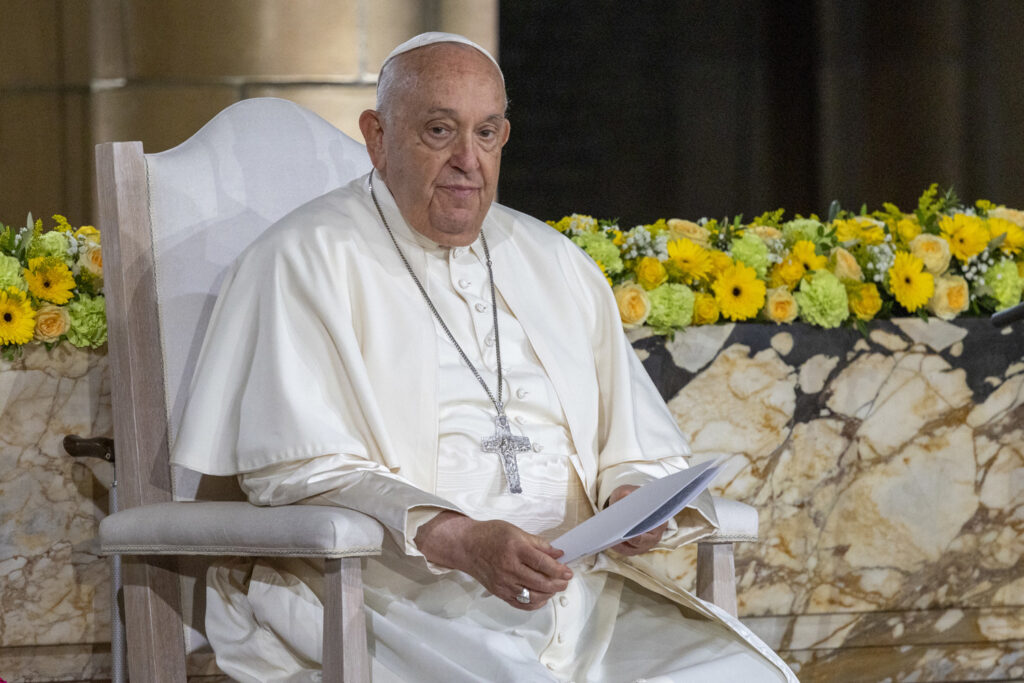On Easter Sunday 2025 at the Don Bosco Church in Buizingen – the parish where I was privileged to be pastor for nearly 30 years and which has now been abolished by the archbishop because "lay people" are doing masses there – the opening words of the Easter celebration, presided over by three women sounded as follows:
New life arises in the dark
Whether it is a seed in the ground
a baby in the mother's belly
Or Jesus in the tomb
it begins in the dark
This is the first thought that comes to my mind at the news that Pope Francis died on Easter Monday, 21 April 2025.
The Easter celebration in Buizingen took place so far from Rome and so close to the original event of Good Friday just outside Jerusalem. There on Golgotha, there was no Peter, no pope to be seen, but only a few weeping women who sympathised with the victim.
Whether the pope is dead or not, the papacy will continue to exist, and so will this pope. As beautiful and powerful as his words were at times, his actions toward the victims of sexual abuse in the Catholic Church continue to sound hypocritical, as much as the words of his predecessors.
A decades-long sham
As for myself, because of the long struggle for recognition of the victims of sexual abuse in the Catholic Church, and the now thousands of experiences written down in our non-profit organisation Human Rights in the Church, I cannot separate Pope Francis from his predecessors. Each in their own way, past popes, and Pope Francis as well, have ultimately left the victims as victims. He has, with even more zeal than his predecessors, reminded local bishops of their crushing responsibility, indeed. But the local bishops have, with equal zeal and emphasis, claimed that not they can fix this, but that only the pope can. A sham that has continued for decades now, from generation to generation.
In practice – we see this not only in Belgium, but worldwide – it happens that in all the countries where the Catholic Church means something, in the past there have been huge numbers of victims. And in all these countries there is the same atmosphere: the pope, or the Church, picks out a few victims, showers them with some love bombing, and the 99.90% other survivors from all over the world are treated as if they don't exist. The same has continued under Pope Francis, worldwide.
This pope is perhaps a man of flesh and blood, a man with a big heart, but he also declared Belgian doctors to be assassins when speaking about abortion. In everything he was and remains a representative of the Roman Catholic Church and exactly like his predecessors: an autocrat, a potentate, someone who does not tolerate democracy in his own ranks, speaks mildly but acts authoritatively. Something that world leaders like Trump and Putin can only dream of.
Whether a pope dies or a new one is elected, for the victims of sexual abuse in the Catholic Church worldwide, this changes nothing. As long as the archives on the matter remain closed, from Rome to Australia and from Dublin to Washington, for the Roman Catholic Church and their popes, it remains semper per idem. With even more doggedness and shrewdness, the new structures of the Roman Catholic Church, including those established by Pope Francis, have made it possible to keep their compromising archives in their dark palace vaults even better hidden. 30 years ago, beautiful papal words could still inspire hope; now they ring hollow.
The crimes, inflicted on innocent children, remain anxiously hidden. Tombstones are far from being rolled away. A new uprising for the victims of sexual abuse in the Church has not been made possible by this pope. Most victims no longer wait for a successor. Nor do they expect anything more from their local bishops. It is looking forward to a new tomorrow when the stones that close the archives are rolled away. That will be a day of resurrection and recognition! And that day is getting closer.
Rik Devillé is a priest and founder of Human Rights in the Church, a non-profit organisation that has advocated for justice for sexual abuse victims since 1992.

